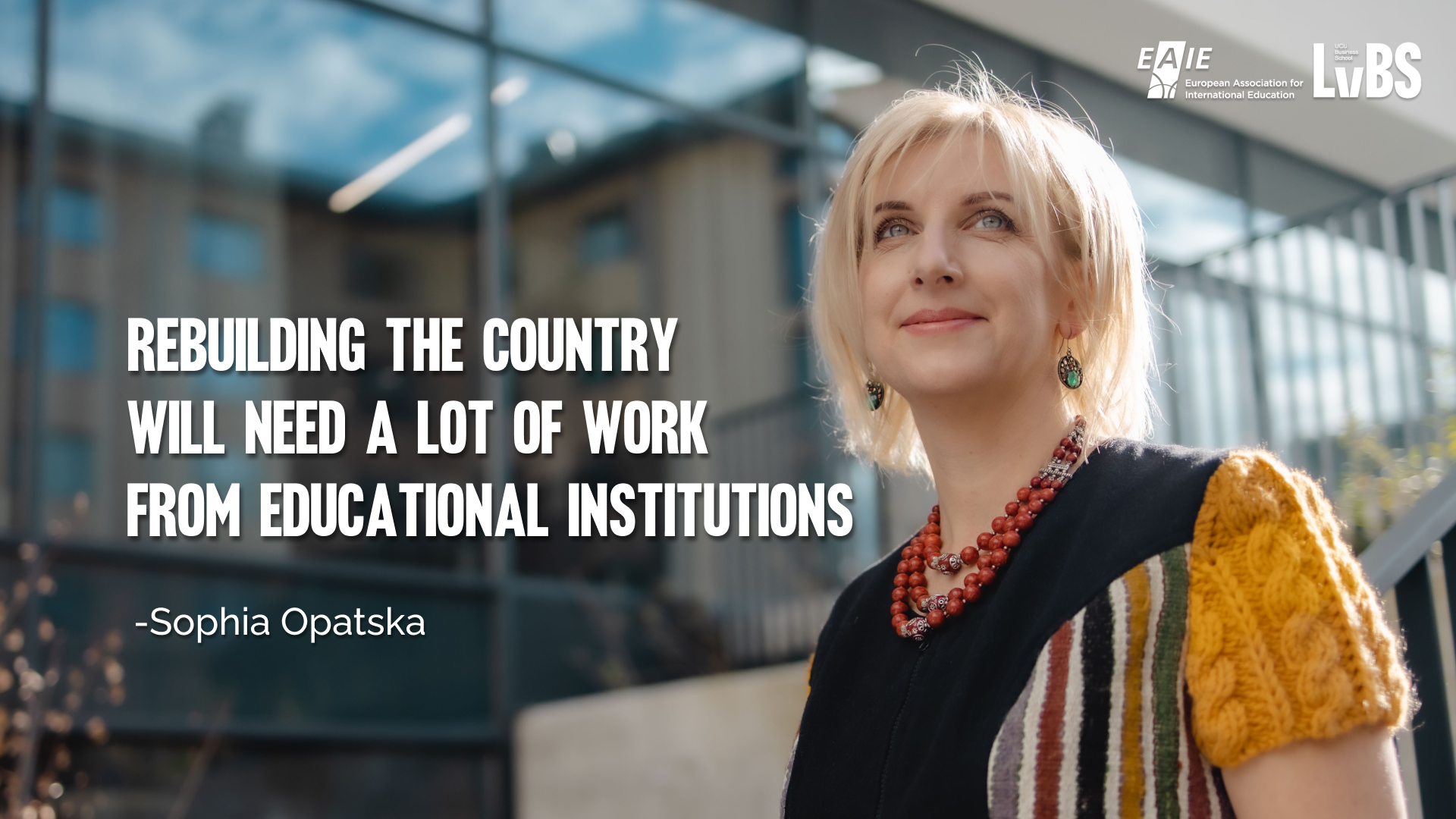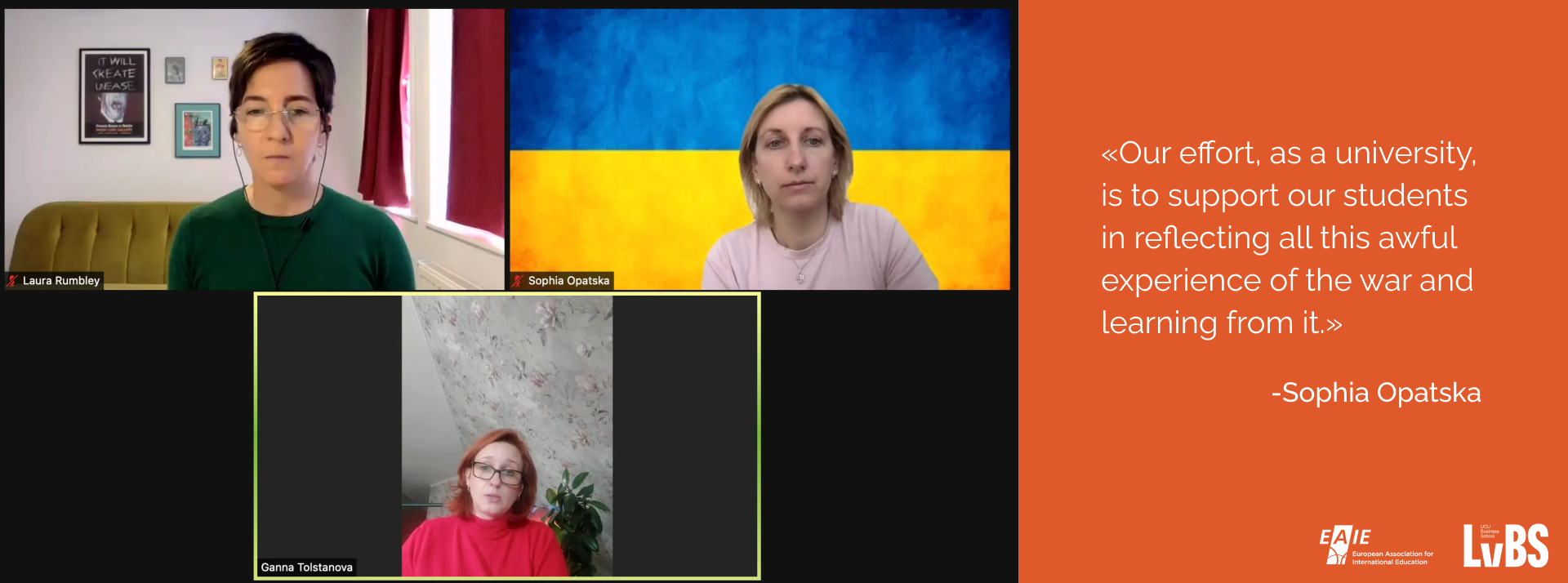The Russian invasion of Ukraine, which began on 24 February, has violently disrupted life in Ukraine. Along with the general population, the higher education sector has been gravely impacted by the war in Ukraine. Campuses have been directly affected, while staff and students (domestic and international) figure among the millions who have fled the country. What do we know at this stage about this highly fluid and urgent situation?
Sophia Opatska, a Founding Dean of the UCU Business School, Vice-Rector for Strategic Development of UCU, takes part in EAIE European Association for International Education discussion. Ganna Tolstanova, Vice-Rector for Research at the Taras Shevchenko National University of Kyiv, also takes part in the live streaming. Laura Rumbley, the Associate Director, Knowledge Development and Research at the EAIE, moderates the dialogue.

Here are some key points of the discussion.
Every day people are losing their lives including children because of the war in Ukraine. There is little data on students from Ukraine – how many left the country and where they are. Because we are a relatively small University for us it is easier to have the picture. The university is doing its best to know where the students and faculty are. 15 percent of Ukrainian Catholic University students are abroad at the moment but we have constant communication with them. Our country is devastated in many regions not only physically but also has huge losses in economics. I just want to give you a couple of numbers: 500 billion and 1 trillion dollars are losses in the Ukrainian economy at the moment. Just in four weeks.
People in Ukraine don’t know exactly the day of the week and the date on the calendar but they know which day of the war it is, – Sophia Opatska.
There is the number that 40% of Ukrainian said that they will not have savings in 1 month which means it will also affect a lot of the decisions including how many students can study next year. There is a level of survival on a safety level and on the economic level as well. And this is a challenge that educational institutions will face the next academic year. Because, as we know, economics and education go together.
Ukrainian Catholic University is located in the west of Ukraine. On the one hand, we can say that it is the safest place in Ukraine right now. But on the other hand, we get air alarms five-six times per day, or night, which means the class or any activity has to be stopped and students go to the shelter together with faculty.
Ukrainian Catholic University now is much more than a university. We host refugees, we do a lot of humanitarian help, during the first month we collected and distributed nearly 1,2 million dollars for humanitarian aid, which was organized mostly by our students. Right now our students are learning much more from life. And our effort, as a university, is to support our students in reflecting on all these awful experiences and learning from them.
Many faculty members completely changed how they teach and are focused on the service learning approach right now. Also, we help students to reflect on what they’re doing. I’m also teaching at university now and in the last class, I got new students – students from Sumy State University. Ukrainian Catholic University opens to students from other Universities and would like to support their learning during this semester as well.
Every single person, no matter where we physically are, is trying to put as much as possible to bring the victory to Ukraine faster, —said Sophia Opatska.

During the discussion, there was the question of what foreigners can do for educators in Ukraine? Here are answers from Ganna Tolstanova, Vice-Rector of Research at the Taras Shevchenko National University of Kyiv:
- Our students are ready to study, and our teachers are ready to work. But some of them were evacuated without even a laptop. So the space and equipment for work would be very helpful in this situation.
- The immediate help would be also a recognition of Ukrainian universities in existing alliances. This step is our opportunity to continue research on a professorship for our scientists and international academic mobility for our students. We assume that a lot of our lecturers and students will not be able to return here in the nearest future because they simply have no place to return.
- An online platform where lecturers can reply for remote positions since we observe the shortening budget in Ukraine.
- The platform where our teachers can create and teach courses about the history and culture of Ukraine.
We understand that many people who left Ukraine will not come back because they just don’t have a place to live, and unfortunately, where they lived might not be rebuilt in the next years. We appreciate the support from partner institutions to host our students and staff. However it is crucial that any proposal keeps in mind how can we avoid brain drain, and make systematic steps to bring some time people back to Ukraine, – mentioned Sophia Opatska.
We already started campaigns to collect money for scholarships for our students for the next academic year as many of them might not be able to pay for education. Since Ukrainian businesses are focused on helping the country to fight and survive economically we understand that major sources for students scholarship for the next year or two will be from abroad. Rebuilding the country will need a lot of work from educational institutions.
One more thing I would like to touch on this conversation—we kindly ask our colleagues from international institutions to be very careful in wording because there is a lot of information about the dialogue between Ukraine and Russia, and Belarus scholars. This is a toxic conversation for Ukrainians. We are leaving our country for very different reasons: one thing is to leave for economic reasons, and another is to leave for safety reasons. It’s really difficult when you look at the announcements of the fellowship for Ukrainians and then in brackets, there are Russians and Belorussian people. We understand that we will have to come to the same table at some moment but this is not the moment right now. So that would be also my message to the international community is to be very careful how the wording is put down, – said Sophia Opatska.





















